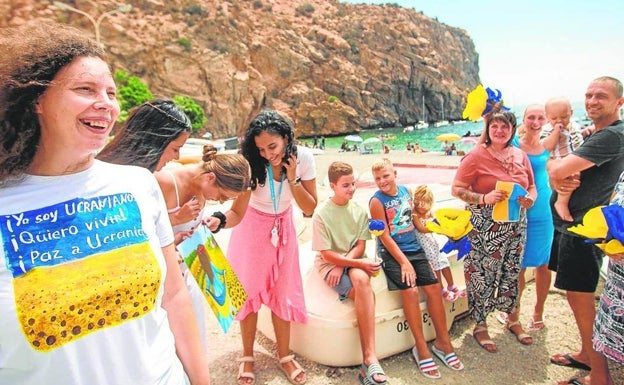

Sections
Highlight

PILAR GARCÍA-TREVIJANO
Tuesday, 27 September 2022, 12:07
A total of 50 Ukrainian people fill the San Juan de Dios building, located in Calle Biznaga, next to the hotel El Embarcadero in Calahonda, in Andalucía's Granada province. A Ukrainian flag adorns one of the balconies; inside, children's drawings greet visitors at the entrance.
Among the paintings of houses and turtles, one of an army tank stands out and amid the green and grey there is room for the blue and yellow of the Ukrainian flag. "It doesn’t seem that way, but the children notice everything," said one of the centre's employees.
The families, all young, arrived in May. The journey for many of them started earlier, as they had fled Ukraine and had spent two months in other European countries until they were taken to a centre in Malaga and from there, referred to the Juan de Dios foundation on the Granada coast.
Andrea Castillo, a social worker and coordinator at the shelter, said that this is the first time the foundation has taken care of war refugees in a centre.
"Some arrived in their own car, by bus, train or plane, passing through different countries for two months to get to Malaga and were referred from an emergency reception centre.”
Castillo went on to say, “We are full right now; the building was used for camps for children with disabilities and for elderly people as a family respite. It was also a holiday place for families in vulnerable situations. The foundation saw the need to have a place to accommodate the Ukrainian families because of the situation they were experiencing and it is the first time we have taken in refugees; it's new for us.”
Seven people, including social workers, educators and translators, are in charge of ensuring the wellbeing of the 50 residents. The centre has been completely refurbished to adapt the facilities to its new function: the home of a large family.
The Ukrainian refugees are provided with accommodation, food, Spanish classes and recreational and sporting activities to help them adapt until they can become fully independent.
"Little by little they are adapting to the area, to the people. We want them to gain independence and autonomy; we want them to know the language so they can fend for themselves and continue their lives here, a life that will be different but in peace," Andrea explained.
“A number of the families have found temporary employment and the children are starting school," she added. However, some families who were hosted at the centre decided to return to Ukraine and their places have been taken by other refugees.
For the foundation's staff, the reception has been a challenge. "It has been a change in our work where new teams have had to be formed. I used to work with homeless people and now I work with people who come from a traumatic situation in the midst of a major conflict and who speak a completely different language. It is rewarding to see how they feel at home and are learning to speak Spanish," she said.
Irina, 37, her husband Vladimir, 39, and their two children, Artem, nine, and one-year-old Nazar, arrived in Spain on 16 March from Kherson. Luba, one of the translators, says that the rest of their family has been left behind. The city was invaded by the Russians and it is difficult for them to make contact.
They knew they had to leave on 24 February, when they saw a missile pass right over the roof where they lived. Vladimir was a truck driver, but by profession he is a sailor and welder. He has found work in a greenhouse and regrets that they have not been able to get a flat.
"There are a lot of requirements, we had everything there and now we have nothing," he said. His children have started school and they hope that they will adapt and grow up happily, far from the noise and destruction of war.
The San Juan de Dios foundation offers shelter throughout Spain. In Granada, where the founding house is located, they also have the San Juan de Dios home for elderly people, homes for people with disabilities, the San Rafael special education school, an early childhood care centre, as well as the San Rafael hospital and a food bank. In terms of cultural centres, the foundation also has the San Juan de Dios archive-museum, Casa de los Pisa, and the San Juan de Dios hospital, which is being restored.
Publicidad
Publicidad
Publicidad
Publicidad
Esta funcionalidad es exclusiva para registrados.
Reporta un error en esta noticia

Debido a un error no hemos podido dar de alta tu suscripción.
Por favor, ponte en contacto con Atención al Cliente.

¡Bienvenido a SURINENGLISH!

Tu suscripción con Google se ha realizado correctamente, pero ya tenías otra suscripción activa en SURINENGLISH.
Déjanos tus datos y nos pondremos en contacto contigo para analizar tu caso

¡Tu suscripción con Google se ha realizado correctamente!
La compra se ha asociado al siguiente email
Comentar es una ventaja exclusiva para registrados
¿Ya eres registrado?
Inicia sesiónNecesitas ser suscriptor para poder votar.